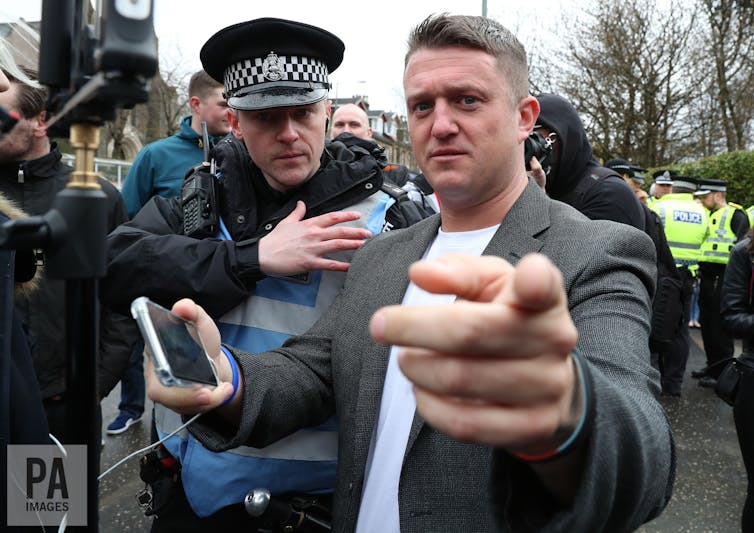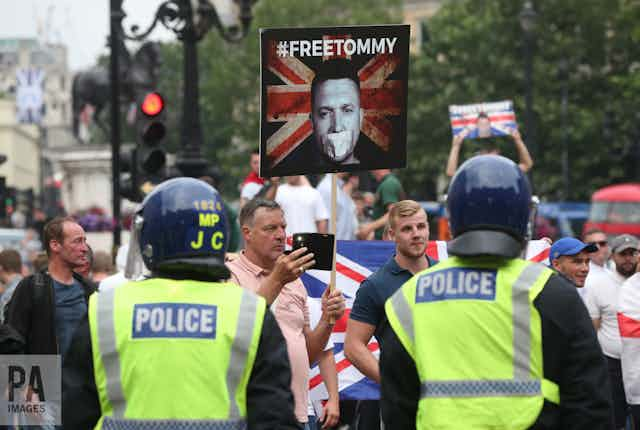When Tommy Robinson, founder of the extreme right-wing group the English Defence League, was jailed recently, he was sentenced for breaching very clear and specific laws restricting what can be reported about ongoing legal proceedings. But the high-profile campaign that has sprung up to call for his release revolves around something quite different. It’s all part of a well established, and highly effective, narrative of right-wing politics, which depicts people like Robinson as victims of a repressive state.
Robinson, whose real name is Stephen Yaxley Lennon, was sentenced to 13 months in prison for live streaming outside a court where a rape trial was taking place. He did this despite a court ban on reporting details of the trial.
Protesters held a rally in central London, waving British flags and carrying banners emblazoned with Robinson’s face and the words “#Free Tommy Robinson”. They scuffled with police officers and some were arrested. The highlight of the rally was a speech by Geert Wilders, leader of the far-right Dutch Party for Freedom. Wilders told the crowd they were “all heroes” before declaring Robinson the “greatest freedom fighter in Britain today”. Hanging on the podium from which Wilders preached hung a banner showing Robinson in combat fatigues. The message was clear – Robinson is a hero and the victim of state political oppression.
This narrative has gained significant traction thanks to the concerted efforts of the far right. Robinson’s arrest sparked a highly stylised campaign, both on and offline, portraying him as merely exercising his right to free speech when he broadcast outside the court. He was protecting the public by “exposing Muslim paedophiles” – presumably a reference to the defendants in the case, who are innocent until proven guilty under UK law. The exact details of the case that Robinson was disrupting are at the moment unclear, due to the reporting ban – the ban that Robinson breached. However, Robinson likes to portray himself as a crusading journalist who “exposes” Muslim crimes.
Depicting Robinson as a victim who was simply exercising his right to free speech is a strategic construction and an entirely false narrative. The facts regarding Robinson’s imprisonment have nothing to do with free speech. He was jailed for contempt of court and for breaching a previous suspended prison sentence, also given for contempt of court (for filming inside Canterbury Crown Court during another rape trial).
The remarks he made on the live stream outside Leeds Crown Court, according to the trial judge, were “highly prejudicial to the defendants in the case” and had the potential to cause a mistrial. That could potentially have cost hundreds of thousands of pounds, as well as forcing the alleged victims to have to go through the stress of another trial. Robinson pleaded guilty and expressed his “deep regret” about his actions. His imprisonment was nothing to do with freedom of speech. It was to do with preventing a fair trial.
The cult of the victim
Far from being a new strategy, the cult of the victim is a major part of far-right identity construction. Robinson is particularly adept at playing his role as an idealised victim –- a trope around which a range of dissatisfied individuals can coalesce with their complaints. The strategy pits the “victim” against a perpetrator – in this case, the British political establishment.

The construction of a victim identity is evident in the highly stylised online material that has been circulating on Facebook and Twitter since Robinson’s imprisonment. A cover of the song “Hallelujah”, produced with alternative words including “paedophiles are celebrated, Tommy Robinson is incarcerated”, attacked the government and called for Robinson’s release. The binary here is simplistically clear – either you are a Robinson supporter or you are a paedophile supporter.
Ultimately, what lies behind the narratives of Robinson’s victimhood is pretty standard Islamophobia. As the “Free Tommy Robinson” petition that has so far been signed by over 600,000 people tells us, “Tommy Robinson has been arrested and jailed for reporting on Muslim grooming gangs … informing the public of all the wrongs committed in the name of Allah”.
Been here before
Supporters have campaigned against Robinson’s imprisonment before. In 2012, when he was jailed for travelling to the US on a false passport, far-right supporters demonstrated outside Wandsworth prison wearing Tommy Robinson face masks and hailing him a “political prisoner”. Back then, the narrative of Robinson as victim didn’t secure much traction. It has found greater success in 2018 because Robinson’s victimhood is contrasted with the predatory paedophilia of what the far right terms “Muslim grooming gangs”. The fact that the alleged real “victims” in the Leeds case may have been forced to go through a retrial as a direct result of Robinson’s actions is a point that is apparently lost on him and his supporters.
Robinson and his fellow far-right supporters are aware that a sense of victimhood is a powerful tool for attracting support and encouraging collective action. In his biography, Enemy of the State, Robinson actually acknowledged the importance of being seen as the “victim”. He enjoyed being in the minority during television debates because he knew that “the whole place was going to gang up on me and that I would come off as the victim … it was exactly as I wanted it to go”.
So Robinson’s deliberate and sustained breach of court orders needs to be called out for exactly what they are –- a calculated strategy rather than heroic self-sacrifice. Robinson and his allies in the far right have got exactly what they want – a martyr who will bring people together within an antagonistic discourse in which Robinson’s suffering is contrasted against the alleged crimes of Muslims and the perceived politically correct totalitarianism of the British state.

